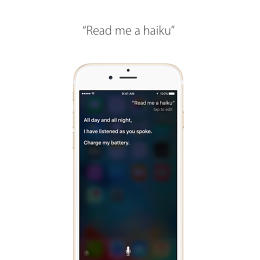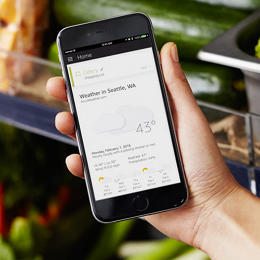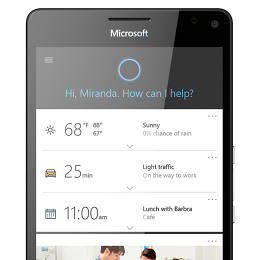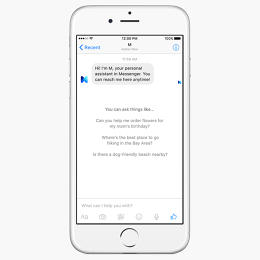Everything You Need To Know About AI Assistants, From Siri To Ozlo
In the latest attempt to fulfill sci-fi movie fantasies, tech firms have been lining up to provide you with a virtual assistant. From well-known voice-powered AIs such as Apple’s Siri to upstarts like Viv, the goal is to quicken the actions you already take on your phone and other devices, growing ever-more efficient at the job by learning from your behavior.
But like any hired help, each of these AI assistants has different skills, blind spots, and quirks. Here’s a rundown of the contenders, including some intriguing newcomers.
Apple Siri
Bio: A voice-driven assistant that talks back to you—invoked by long-pressing the iPhone or iPad home button—and proactively recommends actions to take. Recently took up residence on Apple TV and Apple Watch.

Notable skills: Easy to access on Apple devices. Understands natural human language. Knowledgeable about news, weather, sports, movies, directions, and local businesses. Well-versed in what to watch on TV. Knows how to control some smart home appliances.
Character flaws: Doesn’t know how to communicate with most other apps and services. Not always as fast as some assistants.
Level of humanity: Can’t hold an extended conversation, but cracks wise when given the chance. Female voice doesn’t sound overly robotic.
Outlook: Siri paved the way for modern speech-based assistants, but hasn’t gotten significantly smarter over the past few years. The lack of an open API means you can’t open a song in Spotify, add a task to Wunderlist, or post a message in Slack, even as tie-ins with other apps become table stakes among other virtual assistants. Apple must figure out these types of integrations for Siri to stay relevant; maybe we’ll hear news about them at next month’s WWDC keynote.
Google Voice Search/Google Now
Bio: Voice assistant powered by the world’s largest search engine. Also digs through your email and search history to help you out. Lives on Android devices, iOS, and Chrome.

Notable skills: Fast. Uncommonly accurate with directions. Eerily adept at mining your personal data for flights, packages, reservations, and other useful info. Has some capacity to speak with third-party apps for certain tasks, including notes, messages, and music playback.
Character flaws: Attempts at proactivity can sometimes be a nuisance (e.g., sports scores for teams you don’t care about, directions home from familiar places). No hands in the smart home business. Third-party app integrations seem to have stalled.
Level of humanity: None. Averse to conversation and doesn’t even have a name, aside from “Google.”
Outlook: Google’s vast troves of personal data and search engine knowledge should in theory allow it to dominate the AI business, yet Google hasn’t quite figured out how to turn those advantages into an assistant that truly gets you. For now, Google Now and voice search are capable rivals to Siri, but haven’t reached the next level.
Amazon Alexa
Bio: Voice-activated assistant that lives on Amazon audio gear (Echo, Echo Dot, Tap) and Fire TV boxes and is making its way to other connected devices such as alarm clocks and pet feeders.

Notable skills: Streams music and reads news from multiple sources. Provides weather, traffic, and other info, and controls a growing number of smart home devices. Allows voice purchases for Amazon Prime items and even lets you order a pizza. Open API lets any app or service tie into it.
Character flaws: Housebound with no smartphone integration. May make you wonder if you’re nothing but a receptacle for Amazon goods and services.
Level of humanity: Employs a touch of banter with tricky questions, but is quick to guide you back to business. (“Alexa, what should I do with my life?” “You should write that novel. Amazon Kindle Self-Publishing will help you when you’re done.”)
Outlook: Apple and Google should be terrified of Alexa, which is quickly gaining developer momentum and is now leaping onto new, non-Amazon devices. Still, Amazon doesn’t have its own smartphone platform—anymore—which means Siri and Google’s assistant have an advantage on the one device that matters most to people.
Microsoft Cortana
Bio: Voice- and text-based virtual assistant that’s available on Windows, iOS, and Android. Combines proactive knowledge with answers to queries. Might someday help stop aliens from extinguishing all intergalactic life.

Notable skills: Handles reminders and calendar appointments, tracks packages, sets alarms, and taps into Bing for sports, weather, and other information. Hooks into some Windows apps, and has recently started talking to other bots in Skype.
Character flaws: Feels most at home on Windows, the platform that app developers—and, arguably, users—care the least about. Has fewer capabilities and is harder to access on iOS and Android.
Level of humanity: Loves jokes, especially corny ones, and has a long list of wisecracks at hand for generic questions. Will also quote Shakespeare.
Outlook: After years as an also-ran behind Siri and Google, Cortana has become a much more ambitious chatbot. Microsoft wants its virtual assistant to serve as a master intelligence for all kinds of other bots, guiding you through travel plans, meetings, to-do lists, and more, and to be deeply integrated with other Microsoft products such as Office. The goal is to redefine computing in the post-PC era, but it’s too early to tell whether the company will succeed.
Facebook M
Bio: Part artificial intelligence, part human-powered service, still in development. M is to be a text-based assistant within Facebook Messenger that helps get things done.

Notable skills: Attempts to do anything you might ask it to do.
Character flaws: Doesn’t actually exist as a consumer product, and is a long way from getting there. Only a small number of people in San Francisco have access.
Level of humanity: Extremely high, as M relies in large part on real humans to answer queries. The hope, according to Wired, is that thousands of these helpers will train M to work on its own over time.
Outlook: At the moment, M is little more than vaporware. But given Facebook’s interest in chatbots as a whole, don’t count out M’s eventual arrival as a superintelligence.
SoundHound Hound
Bio: Voice assistant app for iOS and Android. A related service called Houndify will let third-party developers add voice to their own devices and services.

Notable skills: Impressive understanding of complex requests such as “Show me coffee shops within five miles that aren’t Starbucks.” Ties into some third-party services such as Yelp, Uber, and Expedia.
Character flaws: Connections to third-party apps are limited, and no shortcut exists to open the app on iOS and Android.
Level of humanity: Isn’t much for idle chitchat, but knows how to respond to follow-up questions after an initial query.
Outlook: One gets the feeling that Hound’s mobile apps are just a showcase for the Houndify service that SoundHound is hoping to sell to other companies. If it succeeds, you probably won’t even recognize it’s there.
Viv
Bio: Virtual assistant from the inventors of Siri. Not available yet, but intended to run on all kinds of computing devices.

Notable skills: Viv’s claim to fame is that it can interpret complex questions such as “Will it be warmer than 70 degrees near the Golden Gate Bridge after 5 p.m. the day after tomorrow?” Tie-ins with third-party apps like Venmo are in the works.
Character flaws: Little proof that it actually functions as advertised outside of prepared demos.
Level of humanity: Appears to favor visuals and actual information over descriptive feedback. Capacity for banter is unclear.
Outlook: Viv has received plenty of hype from the tech press, as its natural language skills make for an impressive demo. But until the startup announces when it’ll launch and on what devices, it’s best to remain a teeny bit skeptical of its world-changing claims.
Ozlo
Bio: An AI whose sole purpose, at least for now, is to help you find things to eat and drink. Available to a limited number of early sign-ups.

Notable skills: Finds and internalizes data from multiple sources such as Yelp and Foursquare, pulling it all into slick informational cards. Tries to be conversational by offering and understanding follow-up questions, such as “which ones are open now?” and “what’s on the menu?”
Character flaws: Limited utility, at least until Ozlo’s makers start adding more capabilities. Heavy reliance on users to train the AI.
Level of humanity: Appears to avoid human pleasantries beyond a brief greeting by name.
Outlook: Ozlo wouldn’t be much different from the long list of other single-purpose chatbots if it wasn’t promising to be something bigger. Its ability to string together different data sources in a single query is unique, but it’s unclear if the app can fulfill the potential that its creators are promising. And unless Ozlo has a business plan that involves more than just a downloadable app, it may have trouble getting the training data it apparently needs to succeed.
X.ai
Bio: One of several single-purpose virtual assistants. Exists solely via email to schedule meetings on your behalf.

Notable skills: Knows your schedule and preferences, handles the legwork of corresponding with other parties.
Character flaws: Relies heavily on humans to verify the vast majority of calendar data from emails that the virtual assistant, “Amy,” generates, according to Bloomberg.
Level of humanity: Unsurprisingly, has been praised for its humanlike capabilities and tone.
Outlook: Highly focused intelligent agents like X.ai will be great if they ever become smart enough to operate autonomously. Then again, people who don’t mind the appearance of having an assistant for meetings might be able to afford real assistants.
SpeakToIt Assistant.ai
Bio: One of many Siri knockoffs, for lack of a more charitable term. A search for “Siri” in the app store brings up plenty of others, such as Voice Commands, Voice Secretary, and Assistant.

Notable skills: Little to speak of beyond Siri, but it can learn custom voice commands to activate its existing list of skills.
Character flaws: Not as useful as the virtual assistant your phone comes with, and not as easily accessible.
Level of humanity: Sounds pretty robotic, but presents itself as a drawing of a human secretary, whose gender and appearance are customizable.
Outlook: Some of these Siri-alikes seem like holdovers from when not all iPhone models supported Apple’s own virtual assistant and needed a stand-in. In any case, their makers may have realized the idea isn’t a winning one. SpeakToIt, for instance, has pivoted to a set of tools that help developers make their own chatbots.
Fast Company , Read Full Story
(74)













